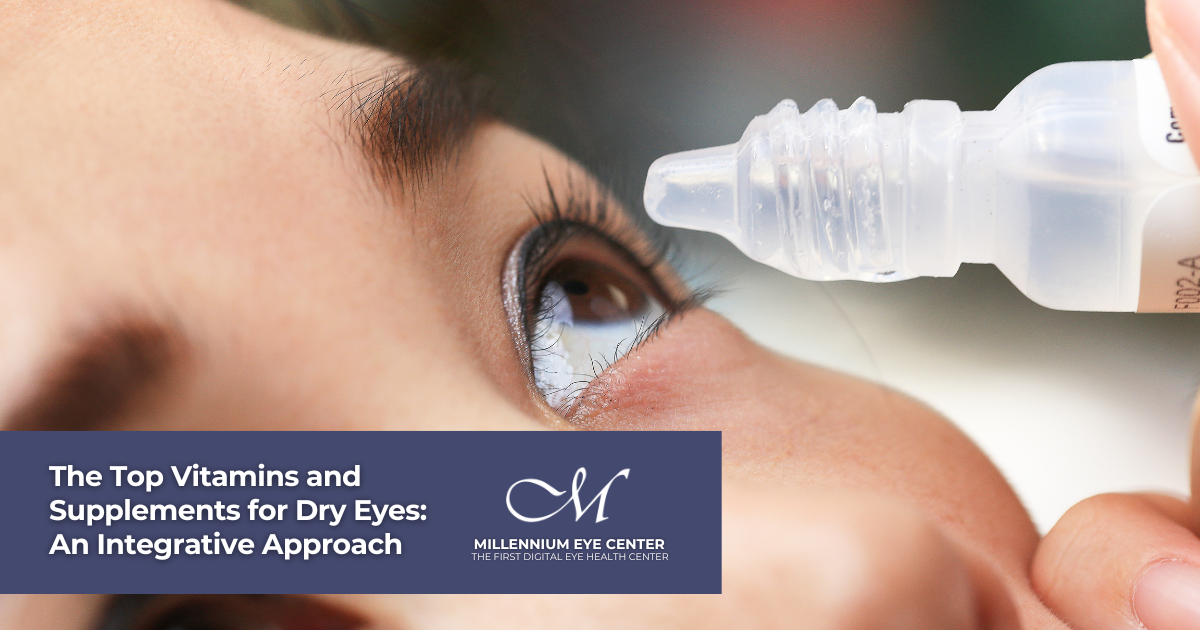Dry eye syndrome is a common and often chronic condition that causes discomfort, blurry vision, and irritation. While artificial tears and prescription medications are important tools for managing symptoms, an integrative approach recognizes the role of underlying systemic conditions, nutrition, and lifestyle in supporting ocular surface health.
Understanding Dry Eye Causes
Dry eye disease is multifactorial. Identifying the root cause is critical for effective management. Common contributing factors include:
| Condition | Impact on Dry Eyes | Integrative Recommendations |
|---|---|---|
| Meibomian Gland Dysfunction (MGD) | Blocked oil glands reduce tear film stability. | Warm compresses, eyelid hygiene, omega-3s high in EPA, in-office treatments like LipiFlow. |
| Autoimmune Disorders (e.g., Sjögren’s syndrome, rheumatoid arthritis) | Attack on tear glands and mucous membranes. | Anti-inflammatory diet, high-dose omega-3s (EPA dominant), vitamin D optimization, systemic medical management. |
| Hormonal Changes (e.g., menopause) | Hormonal fluctuations decrease tear production. | Hormone balancing strategies, omega-3s (EPA), vitamin D, hydration. |
| Medication Use (e.g., antihistamines, antidepressants, isotretinoin) | Decreased tear production as a side effect. | Discuss alternatives with prescribing physician, omega-3 supplementation, increase water intake, humidifier use. |
| Screen Time and Poor Blink Rate | Increased tear evaporation. | 20-20-20 rule (every 20 minutes, look 20 feet away for 20 seconds), conscious blinking exercises, omega-3s, eye drops. |
| Allergies | Inflammation of the ocular surface. | Allergy management, lubricating drops, quercetin supplements, omega-3s. |
| Environmental Factors (dry air, wind, pollution) | Tear film instability and increased evaporation. | Protective eyewear, indoor humidifiers, barrier ointments at night. |
The Top Vitamins and Supplements for Dry Eyes
An integrative eye care plan incorporates key vitamins and supplements to reduce inflammation, improve tear quality, and support the ocular surface.
1. Omega-3 Fatty Acids (Focus on EPA)
Why: Omega-3s reduce inflammation and enhance the oily layer of the tear film, preventing rapid tear evaporation.
✅ Important: Choose omega-3 supplements with a higher EPA (eicosapentaenoic acid) content, as EPA has the strongest anti-inflammatory effects.
Sources:
-
Fatty fish (salmon, mackerel, sardines)
-
Fish oil supplements rich in EPA
-
Algae-based omega-3 supplements (for vegetarians)
Recommended Dosage: 2,000 mg/day of EPA + DHA combined, ideally with a higher EPA ratio.
2. Vitamin D
Why: Deficiency is linked to increased ocular surface inflammation and dry eye symptoms.
Sources:
-
Sunlight exposure
-
Fortified foods (milk, orange juice)
-
Supplements
Recommended Dosage: 600–800 IU/day; higher doses may be necessary if deficient (test levels first).
3. Vitamin A
Why: Essential for maintaining a healthy conjunctival and corneal surface; deficiency can cause severe dryness.
Sources:
-
Carrots, sweet potatoes, spinach
-
Liver
-
Fortified cereals
Recommended Dosage: 700–900 mcg/day (based on age/gender).
4. Vitamin E
Why: Protects eye tissues from oxidative damage and supports tear film stability.
Sources:
-
Almonds
-
Sunflower seeds
-
Spinach
Recommended Dosage: 15 mg/day for adults.
5. Lutein and Zeaxanthin
Why: These carotenoids protect against oxidative stress and support overall eye surface health.
Sources:
-
Kale, spinach, collard greens
-
Egg yolks
Recommended Dosage: 6–10 mg/day lutein, 2 mg/day zeaxanthin.
6. Zinc
Why: Supports vitamin A metabolism and retinal health.
Sources:
-
Oysters
-
Beef, poultry
-
Pumpkin seeds
Recommended Dosage: 8–11 mg/day, based on age and gender.
7. Gamma-Linolenic Acid (GLA)
Why: GLA, an omega-6 fatty acid with anti-inflammatory properties, can enhance tear production and reduce irritation.
Sources:
-
Evening primrose oil
-
Borage oil
Recommended Dosage: 300 mg/day (consult your provider).
Lifestyle Tips for Dry Eye Management
-
Eat an Anti-Inflammatory Diet: Emphasize fruits, vegetables, healthy fats, and lean proteins.
-
Stay Hydrated: Dehydration can worsen dryness.
-
Blink Regularly: Especially during screen use.
-
Use Humidifiers: Maintain optimal indoor air moisture.
-
Manage Stress: Stress hormones can exacerbate inflammation.
-
Protect Your Eyes: Wear wraparound sunglasses in windy or dry environments.
Conclusion
Taking care of your eyes from an integrative perspective involves more than just treating symptoms. By incorporating these vitamins and supplements into your daily routine, alongside a healthy lifestyle, you can support your eye health and alleviate the discomfort of dry eyes. Always consult your healthcare provider before starting any new supplement to ensure it’s safe and effective for you.
Schedule your Eye Exam
If you are experiencing dry eye symptoms, schedule an appointment with us today. Call or text/407-292-9812 or click HERE. We’ll work together to create a personalized plan to relieve your discomfort and improve your eye health.
Disclaimer: This blog post is for informational purposes only and should not be considered medical advice. Please consult with a qualified eye care professional for any questions or concerns about your vision.

